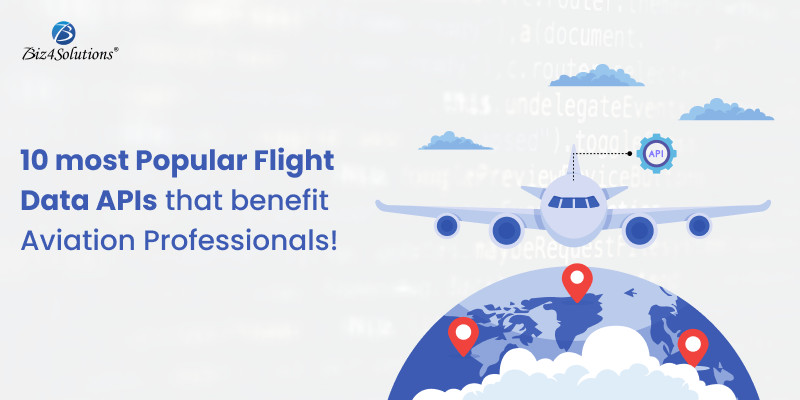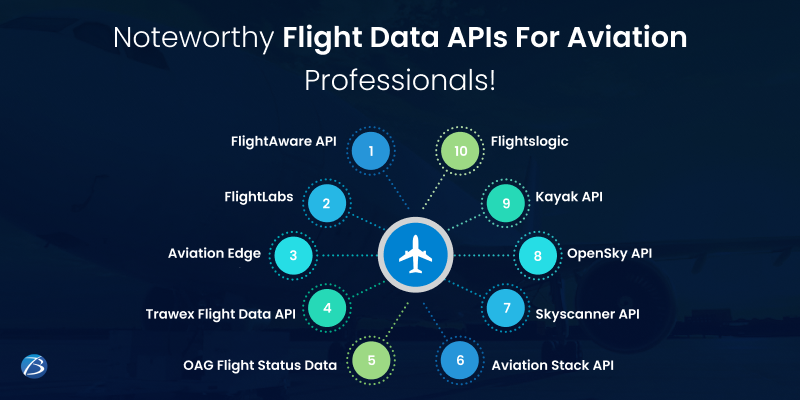
In today’s world of digital transformation, emerging technologies are revolutionizing the aviation sector like never before. When speaking about transformation, API integration plays a vital role in the aviation sector and brings a lot to the table. Information-providing APIs have transformed professional aviation services altogether by addressing the bottlenecks posed by legacy systems. They obtain information from authentic sources resulting in effective and accurate data collection. This makes room for timely actions and strategic planning. For instance, using Flight Data APIs, airline authorities can provide real-time flight-related data on their website to keep their customers updated with the latest information about their flight schedules.
APIs also provide crucial aircraft information to aviation professionals. This information helps aircraft operators identify, analyze, and address risk factors and ensure operational safety. Besides airline companies and passengers, APIs have something in store for almost every stakeholder of the aviation industry including travel agencies and airport authorities.
However, there are various types of APIs available in the market and it’s important to choose the solution that will suit you best for obtaining productive outcomes. This post enlists the noteworthy APIs providing flight data along with their offerings. Take a look!
What Is Meant By Flight Data APIs?
These are APIs that collect, process, and analyze flight-related data. This involves an automated process that generates reports regarding aircraft engine conditions, flight reviews, and safety trends. Developers employ REST/JSON or SOAP/WSDL for writing queries using these APIs. Using standard web protocols like REST (Representational State Transfer) or SOAP (Simple Object Access Protocol) these APIs retrieve and send data across different systems.
The API extracts data directly from the sources. Only authorized individuals can access this data and use it without having to distort the initial codes. Using this data one can access and retrieve historical as well as real-time data related to flights, airlines, airports, etc. As such, aviation professionals can effortlessly track flights and retrieve other crucial information while passengers can book flight tickets without any hassles.
The APIs are like a centralized repository of fight-related information that can be utilized by software developers, travelers, airline companies, and airport authorities. Any business related to the aviation industry can use such APIs. Some examples are airline companies, airports, ticket booking brands, tour operators, destination marketing agencies, corporate platforms for booking, etc.
Why Are Flight Data APIs Important For Aviation Professionals?
Flight Data Service APIs are valuable tools that provide vital information to transform aviation operations. Aviation professionals use such APIs to track the real-time status of flights. This makes it easy for airline companies and airport authorities to keep track of crucial aspects like flight delays, cancellations, and route diversions. As such, managing aviation operations become effortless and hassle-free. With the help of Flight Data-generation APIs, aviation authorities can collect real-time data regarding weather conditions, flight paths, and airspace congestion. etc. This information helps in optimizing fuel consumption, minimizing carbon emissions, and reducing operational costs.
The API data facilitates aviation industry tasks like flight route planning, flight time estimation, and accurate calculation of fuel requirements. Such data is used for optimizing flight schedules and reducing delays. Also, airlines can provide up-to-date information to customers on the status of flights, delays, and cancellations. This leads to improved customer service.
Flight APIs can help aviation authorities identify potential safety and security issues as well. APIs can quickly represent actionable data and accurate stats about each moment during an ongoing flight. For example, an API produces data on safety aspects like the degree of deviation from the mandated aircraft limits or anomalies in the standard operational procedures. This way, aircraft operators get valuable insights regarding a flight’s safety and can identify potential safety risks.
Noteworthy Flight Data APIs To Consider

FlightAware
The FlightAware API is compatible with all programming languages making it a preferred choice for professional aviation solutions. Using this API’s flight data, you’ll be able to track any commercial flight across the globe including the flights belonging to the general aviation sector in Canada and U.S.A. Once you furnish details like the flight’s number, route, airport code, etc. you can view the real-time status of that flight. You can also view full-screen live maps for ongoing flights including the NEXRAD radar overlay. It sends users to push notifications to provide crucial information like flight-related alerts, nearby flights, airport delays, etc.
The FlightAware API has two different categories- AeroAPI and FlightAware Firehose.
The AeroAPI (earlier known as FlightXML) is a query-based web service API. It gathers real-time data for flight tracking and also the latest historical data. It’s suitable for you if you’ve small-scale aviation data requirements.
If your data solution is large-scale and enterprise-grade, FlightAware Firehose will be an ideal pick. It is a data feed on TCP with TLS/SSL that offers real-time data of aircraft positions across the globe. It’s a live streaming API that provides data like information on an airplane’s weather conditions and surface positions, something that AeroAPI is not capable of.
Aviation Edge
This Flight Information API gathers data from multiple different reliable sources. These sources include aviation sector associates like airports or airline firms and genuine official authorities. The accuracy levels of the information provided by this API are very high. Also, the Aviation Edge team ensures that the information available to users is always updated as per the latest available data.
They offer six kinds of different APIs including free as well as premium ones. These cater to airport schedules, flight tracking, airline route, nearby airports, aviation databases, and an autocomplete function for the names of airports and cities. Check out their uses:
Schedules API– This API caters to digital airlines, flight delay platforms, cab booking agencies, insurance firms, airplane spotters, corporate booking firms, cargo forwarders, analysts, etc.
Flight tracker API – It furnishes data related to interactive flight maps, aviation traffic analysis, early detections regarding flight delay, booking, cargo forwarding data, etc.
Airline Routes API– It provides information on flight route analysis for new opportunities, destination marketing, the opening of new connections, etc.
Historical Schedules API– Get comprehensive historical data about airport timetables around the globe. This data can be based on any particular data or a range of dates from the past. The response time of this API is really very fast.
Flight Delay API– It displays information on flight delays and cancellations. Users can scan and check whether a particular delayed or canceled flight is eligible for compensation.
Nearby Airports API– Locate airports near cities or find cities near airports. Identify the exact location based on latitudes and longitudes.
Future Schedules API- Find the flight schedule, departure gate information, timetable, etc. for a future date.
Autocomplete API– Put an input value containing hints – some letters of the name of an airport or city. The autocomplete function provides an output in the form of the full name of the desired city or airport.
Aviation Database– This API provides information regarding airlines, airports, cities, countries, taxes, time zones, icao, iata, etc.
Skyscanner API
This software solution for the aviation sector facilitates flight search and flight booking. This API comes with a RESTful API format and XML and JSON responses. It offers an advanced search experience as this program understands long-form queries. With this API, users can identify real-time flight fare trends and pick the best deals.
The Skyscanner API comes with a mobile-first approach with a flexible and easy-going travel search mechanism. It enables real-time price streaming and users can browse through live feeds displaying flight fares. Besides fight fares, this API provides handy information on airplanes, airlines, and airports across the world. This makes them a valuable resource for business brands that have a global presence.
You get a huge variety of geo formats. Also, you can effortlessly integrate this API with the already existing geo-tagged pages on your website. The Skyscanner API offers technical support for integrating with an engineering team, a dedicated account manager, and a developer hub. The developer portal empowers you with abilities like online test harnesses, log modification, etc.
Kayak API
This API is a travel fare aggregator with a travel metasearch engine. Travel partners can leverage the functionalities of this travel metasearch engine to offer amazing services to customers. This API enables one to query location-related information. Users can obtain different kinds of information including live airplane routes & fares, car rental bookings, and hotel bookings.
The API enables users to identify the best flight fare deals among numerous airline tickets. This API provides a Price Forecast Tool. This tool determines the possibility of a flight ticket price change for a specific destination within the next seven days. It uses historical data to draw such inferences. This information guides customers to decide the right time when they should book tickets.
Thanks to Kayak’s detailed documentation and other available resources, you can easily implement this API into your mobile or web app.
Aviation Stack API
This API offers a wide range of real-time aviation data services. It includes every aspect of the aviation industry right from airline routes, historical flight schedules, country lookups, and the list goes on. Its services are utilized by diverse service providers related to the aviation sector like ticket booking platforms, aircraft monitoring applications, visualization programs, etc. This is an ideal solution for accessing global flight data as it covers over thirteen airline companies and more than 250 countries.
This API delivers live flight data as well as historical flight-related data ensuring high accuracy levels. It provides updates about ongoing flights in real-time within thirty to sixty seconds. Users get live updates on the status and schedules of flights. Moreover, this flight API is versatile and comes with a host of endpoints, enabling one to access data without hassles. So, users can easily obtain the latest updated information on airplanes, airports, aviation routes, destinations, etc.
Flightslogic
With FlightsLogic API, one can access information from over 750 GDS airlines and over 200 LCCs. It helps in monitoring PNRs, providing the latest flight status updates, and furnishing information on the schedules and connections of airlines. This API is valuable to aviation service providers and travel agencies. It delivers an improved customer experience while reducing software development and operational costs.
FlightsLogic API offers an array of tools that gather and analyze data covering various types of safety-related aviation data metrics. So, users can identify the already existing risk factors and also the emerging risks.
This API runs on Microsoft Azure and hence, promises high-grade security, availability, and reliability.
OpenSky API
This API data service is one of the most reliable options for generating flight data. With OpenSky, you can extract live data and also partial historical data. This exhaustive database not only allows you to track flight data but also update this information. It offers numerous functions that help you to track a specific airplane, a sensor, or the entire network. You can use this API with any language that supports REST APIs based on JSON. You can also capture live airspace data that is beneficial for research and other non-commercial tasks.
OAG Flight Status Data
OAG Flight Status Data helps you get accurate and reliable real-time and historical flight data. OAG extracts data from every booking, journey, departure, delay, landing, etc. to make sure that all data are available to users whenever needed. They use predictive software tools to provide alerts to users. These alerts are so fast and timely that consumers are completely in sync with their scheduled flights. Employing this API, you can offer your customers valuable flight-related information such as flight delays, flight-time changes, cancellations, etc. You also get updates on the existing weather conditions and weather forecasts for a certain period.
FlightLabs
The FlightLabs API provides a wide variety of flight data to users. This includes real-time information about flight schedules, status, delays, flight fares, and many more. Their data is up-to-date, accurate, reliable, and secure.
The FlightLabs API is highly flexible as it comes with multiple API endpoints. So, users can access any particular data that they require. Users can also customize their data feeds based on their distinct requirements. Furthermore, this API provides comprehensive documentation and a dynamic support system. This assists software developers to integrate FlightsLabs into their systems effortlessly and get started without any hassles.
Trawex
This API offers data related to flight performance. This API aggregates information from various reliable data partners across the world and delivers it to their users. This information caters to airspaces, airplanes, airports, airline operators, air traffic, audit outcomes, and occurrences. World’s top airport authorities, airline companies, and travel agencies can utilize this data to deliver elevated customer experiences.
This API helps you to investigate aviation hazards to ensure flight safety protocols and compliance with the latest aviation guidelines and standard regulations by authorities. This is a customizable solution that can analyze the entire flight data with minimum possible user interaction.
The data obtained from Trawex helps developers to build web plugins and software apps. It also helps in efficiency analysis and insurance claims.
Closing Thoughts
Flight data-producing APIs are handy tools for aviation professionals. The real-time data and insights generated by Flight APIs help aviation authorities to boost efficiency, strengthen security, and improve customer service. APIs have something in store for every stakeholder in the aviation sector. However, every API comes with a unique set of functionalities, terms of usage, and pricing strategy. You need to pick the one that is the best fit for your requirements.
If you are a novice in this arena, it’s advisable to partner with an experienced software development services company that will create a professional aviation solution, advise you on selecting the right APIs, and integrate those APIs flawlessly with your existing system. Professional services can also take care of your customization requirements to meet your unique needs.



